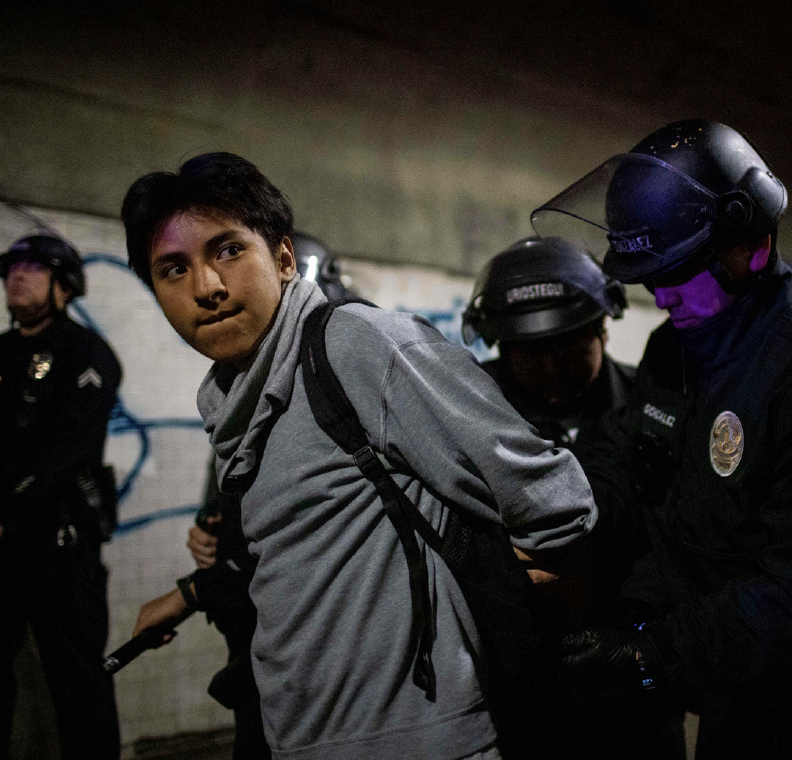Santa Clara University Outlines Protocols Amid New Immigration Enforcement Policies
President Donald Trump’s administration changed an Immigration and Customs Enforcement, more commonly known as ICE, policy to allow the agency to carry out raids and arrests near churches and schools on Jan. 22, forcing many institutions to set protocols for handling potential enforcement activity.
Raids near these “sensitive locations,” as they were termed by the federal government, had been halted since 2011, when the Obama administration announced a policy that limited ICE’s autonomy to engage in enforcement activity near such sites.
Photo provided by the Associated Press. Police detain a demonstrator during an immigration rights protest Feb. 3, 2025, in Los Angeles.
The policy change sent shockwaves through university campuses nationwide. In response, a number of universities have enacted or affirmed protocols in the event of ICE activity near campus.
Over the past month, Santa Clara University has disseminated its protocols in the event ICE activity occurs on campus to the University’s various departments. The procedure is in place, the University says, to “assist in timely information gathering” and “ensure proper follow-up” with federal agencies while centering student safety.
University affiliates who encounter federal immigration enforcement agents are directed to request the agent’s credentials and inform the agent that the University has specific protocols in place. If a federal agent attempts to serve the affiliate with a subpoena, search warrant or other legal order, agents will be referred to Campus Safety Services or the Office of the General Counsel, the University said in a statement to The Santa Clara.
Once the Office of the General Counsel accepts the agency’s request, they will “confirm or clarify” the University’s obligation to respond.
According to their statement, the University has developed these protocols in efforts to “protect student and employee privacy,” and “ensure the University and inquiring agencies are following the law.”
The University’s interest in ensuring the safety of its undocumented student population dates back well before these newest federal policy changes.
In 2024, the state of Texas sued the United States federal government, arguing that the Deferred Action for Childhood Arrivals policy, or DACA, enacted during the Obama administration was unconstitutional. The law provided an avenue for undocumented immigrants who arrived in the United States as children to seek amnesty from immigration enforcement.
In this case, Santa Clara University was among a group of institutions of higher education to sign an amicus brief filed in support of the United States’s defense of DACA. The brief, signed by the University and 167 other schools, argued in part that the revocation of DACA protections would “be a significant blow to the U.S. economy and have a devastating impact on hundreds of thousands of families.”
Additionally, the University’s Jesuit community has been granting the Alberto Hurtado, S.J. Scholarship, a full-tuition scholarship currently set aside for undocumented students, for nearly two decades. Undocumented students often have difficulty applying for many other, external scholarships due to their complicated residency status.
The University’s policies in response to potential immigration enforcement resemble protocols that other institutions have published since January. The University of Southern California follows a similar multi-step process.
The University’s Undocumented Students and Allies Association, or USAA, held an event in collaboration with the Katherine and George Alexander Community Law Center on Jan. 30 titled “Immigrants Rights in the New Administration.” At the event, students had the opportunity to ask questions regarding the potential impact of these updated immigration enforcement policies.
USAA is planning an event to be held during week 8 of winter quarter to discuss the University’s policies, but this event has not been finalized.
Since the inauguration of the new administration, no ICE activity has been reported on or immediately around the University.
